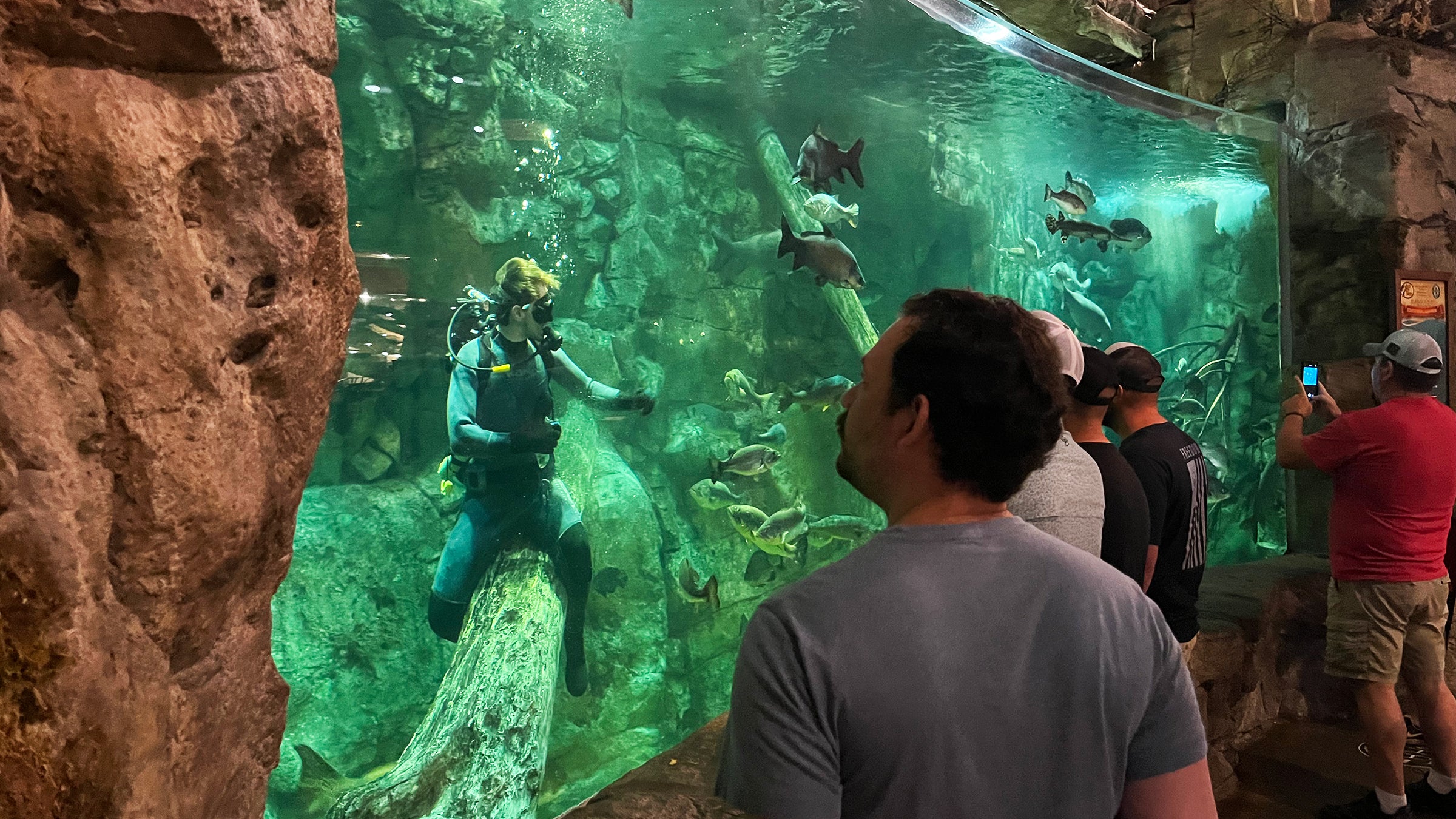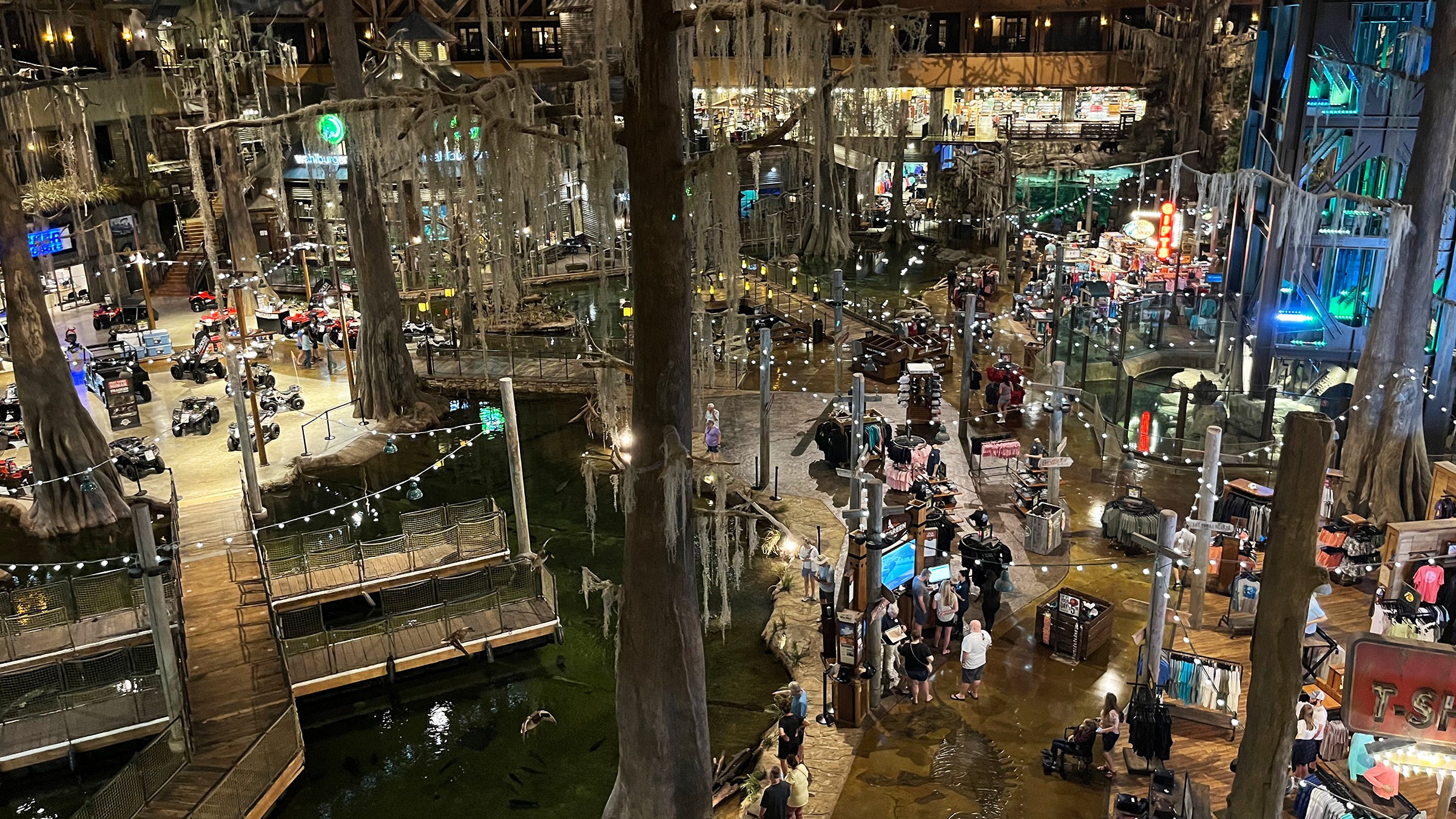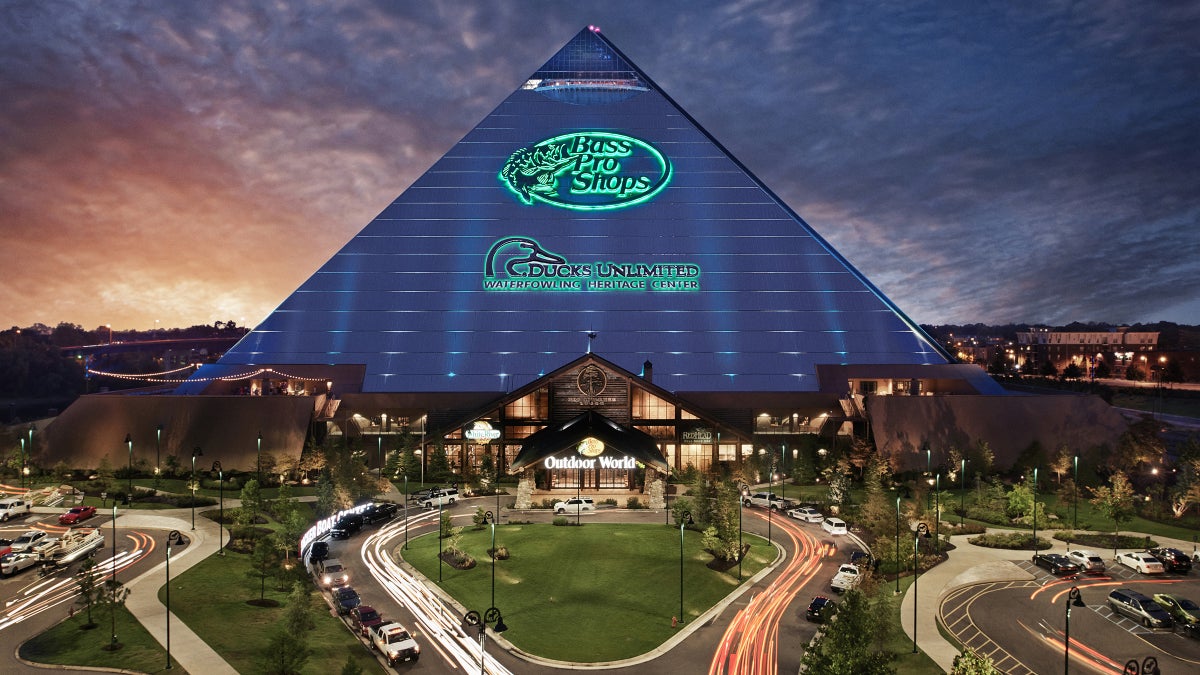No products in the cart.
Outdoor Adventure
How the Bass Pro Shops Pyramid Became a Memphis Icon
Johnny Morris launched Bass Pro Shops in 1972, when he was in his mid-twenties, as an eight-square-foot counter of high-end fishing gear in the back of his father’s Springfield, Missouri, liquor store. Within two years, Morris had started a mail-order catalog; before the decade was out, he was selling his own line of fishing boats.
By 1981, Morris had moved into his own store. It grew through the years, and in 1992 the St. Louis Post-Dispatch ran a somewhat incredulous article noting that Bass Pro Shops’ retail location, known as Outdoor World, was the state’s busiest tourist attraction. “If the guys here at Outdoor World are such devoted outdoorsmen,” the writer wondered, “what’re they doing inside watching the Incredible Sports Bloopers video on a nice day like today?”
By the late 1990s, as Morris began to expand, he found himself being courted by politicians. The mayor of Oklahoma City—who authorized the construction of a $17 million building that would be rented to Morris’s company—compared the presence of a Bass Pro Shops in one’s town to having a home baseball game every day of the year.

As for Memphis, the city is more associated with ducks than baseball. It’s home to the famous duck walk at the Peabody Hotel—in which five mallards who live on the roof take an elevator to the lobby floor, exit, and waddle to a fountain, where they quack and splash at 11 A.M. and 5 P.M daily. Memphis is located in the middle of the Mississippi Flyway, and leaders soon saw Morris’s retail shrine to hunting and fishing as the perfect answer to their great architectural albatross, the pyramid.
Morris seemed ambivalent. The canonical story of the Memphis store’s construction—which I heard at least five times during my visit—involves a fishing trip on the Mississippi River. Morris was weighing whether to put a store in the pyramid, and to make the decision easier, he decided he’d do it only if he caught a 30-pound fish. When you’re touring the store, a disembodied voice tells this story, dramatically saying: “Everything you see … would have never happened had it not been for one big old Mississippi River blue cat.”
The city picked up the nearly $100 million tab for the needed renovations; Bass Pro Shops, meanwhile, has rarely paid more than $1 million in rent per year. City officials say the arrangement has been a boon to their economy, drawing hordes of tourists and shoppers who just have to see the place. The pyramid is so large that, once its swamp ponds were dug and filled with 600,000 gallons of water, the building developed its own microclimate. Rinehart, the assistant manager, showed me a photo of wispy fog collecting above 100-foot-tall faux cypress trees. A system had to be installed to sustain a more appropriate level of humidity.
Carmen Jones, the store’s special-events coordinator, was one of several handlers who escorted Liz and me through a very complete tour of the facility. Here was a cold-water pond full of trout. There was a 100-pound catfish, which had been caught during the annual Mississippi River Monsters Catfish Tournament and deemed so impressive that it was pardoned and brought inside as a living display. Here were lake sturgeon, whose incredible size—the largest one in the store is three decades old and weighs 150 pounds—took my breath away. (Not everyone was speechless: “They’re good eatin’ if you get the caviar!” I overheard one young shopper exclaim to his dad.) There’s a 38,000-gallon aquarium tank where, twice a day, an employee in a diving suit conducts live feedings. The “aquarist” I interviewed—a self-described nerd for all things fishy—told me that his typical day starts at 6 A.M., when he prepares the food and then wades into the ponds to feed the beasts.
The pyramid is also home to a few young alligators and—the latest addition to the menagerie—an alligator snapping turtle, the only creature granted the dignity of a name: Jenny Morris, a winking tribute to Bass Pro Shops’ founder, bestowed through an online vote. Fittingly for Memphis, there are also four species of ducks. They can’t fly, because their wings have been clipped, but have free range to waddle. This explains another crucial morning task: cleaning up poop.

As hotel guests, we got to skip a long line of people waiting to pay $8 to ride to the top of the pyramid inside the tallest free-standing elevator in the U.S. The lookout deck up top, 300 feet above the city, offers the most stunning view of the Mississippi River anywhere along its southern reach.
At one point, I remarked on the attention to detail, and Jones noted that this level of immersion extends to the quality of light inside: “People don’t understand. They say, ‘It’s so dark in here.’ I’m like, ‘Well, have you ever been to the swamp? It’s supposed to have that feeling.’”
Jones said that sometimes she arrives before sunrise and departs after sunset; hers are full days in the swamp, with no seasons, no weather, just perpetual twilight. Yet there’s always plenty to see. “It’s a retail store,” Jones said. “It’s a restaurant. It’s a hotel. It’s a museum. It’s an aquarium. It’s… it’s, like, sensory overload.”
Source link

